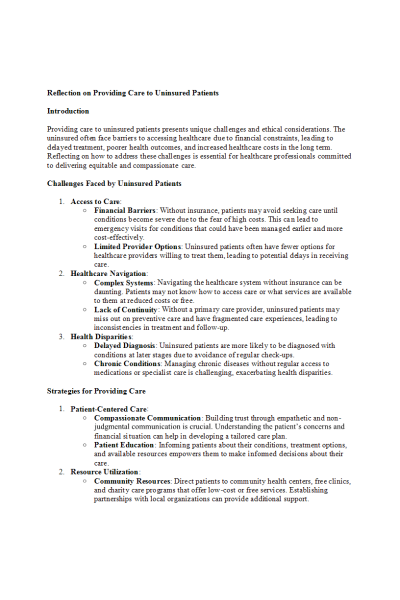NR 576 Week 1 Reflection on Providing Care to Uninsured Patients
-
$15.00
| Institution | Chamberlain |
| Contributor | Maggio |
Document Preview
Reflection on Providing Care to Uninsured Patients Introduction
Providing care to uninsured patients presents unique challenges and ethical considerations. The uninsured often face barriers to accessing healthcare due to financial constraints, leading to delayed treatment, poorer health outcomes, and increased healthcare costs in the long term.
Reflecting on how to address these challenges is essential for healthcare professionals committed to delivering equitable and compassionate care.
Challenges Faced by Uninsured Patients
- Access to Care:
- Financial Barriers: Without insurance, patients may avoid seeking care until conditions become severe due to the fear of high costs. This can lead to emergency visits for conditions that could have been managed earlier and more cost-effectively.
- Limited Provider Options: Uninsured patients often have fewer options for healthcare providers willing to treat them, leading to potential delays in receiving care.
- Healthcare Navigation:
- Complex Systems: Navigating the healthcare system without insurance can be daunting. Patients may not know how to access care or what services are available to them at reduced costs or free.
- Lack of Continuity: Without a primary care provider, uninsured patients may miss out on preventive care and have fragmented care experiences, leading to inconsistencies in treatment and follow-up.
- Health Disparities:
- Delayed Diagnosis: Uninsured patients are more likely to be diagnosed with conditions at later stages due to avoidance of regular check-ups.
- Chronic Conditions: Managing chronic diseases without regular access to medications or specialist care is challenging, exacerbating health disparities……….. Continue
| Instituition / Term | |
| Term | |
| Institution | Chamberlain |
| Contributor | Maggio |




































